A Bolha - see The Bubbles
Fernanda Abreu - see artist discography
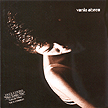 Vania Abreu "Vania Abreu" (Warner-Continental, 1995)
Vania Abreu "Vania Abreu" (Warner-Continental, 1995)
Daniela Mercury's kid sister Vania Abreu reveals a powerful voice on this otherwise lackluster pop outing. Some tunes are fine, wrapped around languid trip-hop dance beats, but while this has little of the cloying or overwrought characteristics drag down so many Brazilian pop albums, it also doesn't have much spark to it. Pretty-sounding, but not fabulous.
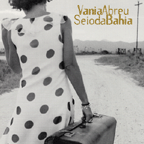 Vania Abreu "Seio Da Bahia" (Velas, 2000)
Vania Abreu "Seio Da Bahia" (Velas, 2000)
(Produced by Paulo Dafilin & Vania Abreu)
I'll go out on a limb here, and say that Ms. Abreu is a better vocalist than her more musically outgoing and more famous big sister, axe star, Daniela Mercury. Her phrasing is more consistent, her voice is sweeter, and her persona less strained. And, of course, there's the music. This is an exceptionally solid, pleasantly mellow album which recalls the natural, relaxed warmth of the best of mid-'70s samba cancao artists such as Jair Rodrigues, as well as the jazz-inflected torch song phrasings of Maria Bethania and other MPB divas. Abreu's vocals, as well as her arrangements, connect emotionally and don't feel forced or desperate to fit into some sort of pop or rock crossover niche. Definitely one of the strongest new releases in the Velas label's North American catalog, and a striking step up from her earlier pop efforts.
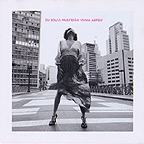 Vania Abreu "Eu Sou A Multidao" (BMG, 2003)
Vania Abreu "Eu Sou A Multidao" (BMG, 2003)
Sad to say, I found this album to be a disappointment... Abreu's vocals are pretty, but the music seems like standard-issue, sleek, classy-sounding MPB. To her credit, she avoids the bombastic, authoritative styles of, say, Maria Bethania or Nana Caymmi, and is closer in tone to a softer sounding diva, like Zizi Possi, perhaps. But nothing on here really captured my imagination, I'm afraid. I would have liked something more innovative, and more in the direction she was headed before. Still, folks who dig the swanky MPB pop-vocals of the 1970s (Bethania, Costa, Creuza, et al.) may find this disc quite enjoyable.
Vania Abreu & Marcelo Quintanilha "Pierrot & Colombina" (YB, 2006)
Vania Abreu "Misteriosa Dona Esperanca" (Tratore, 2007)
Vania Abreu "Pra Mim"
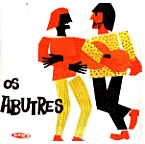 Os Abutres "Os Abutres Atacam" (1968)
Os Abutres "Os Abutres Atacam" (1968)
A totally enjoyable jovem guarda-era frat rock band, with some nice rave-ups and British Invasion-styled harmonies. Mostly, though, they have a peppy rockabilly-garage vibe that's in pleasant contrast to the swarms of jovem guarda pop stars who covered American rock, but never quite "got" it. These guys, however, definitely did "get" it. A fun record, with lots of twangy electric guitars. Very cute.
Academicos Do Salgueiro "Ai Vem O Samba" (Super Sound System, 1957) (LP)
 Mario Adnet & Alberto Rosenbilt "Alberto Rosenbilt & Mario Adnet" (Meia Noite, 1979)
Mario Adnet & Alberto Rosenbilt "Alberto Rosenbilt & Mario Adnet" (Meia Noite, 1979)
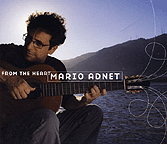 Mario Adnet "From The Heart" (Adventure Music, 2006)
Mario Adnet "From The Heart" (Adventure Music, 2006)
Soft, delicate, Brazilian jazz, with an all-star slate of guest performers... Composer/guitarist Mario Adnet leads a compact ensemble that makes room for Joao Donato on a couple of tunes, and cellist Jaques Morelenbaum on several others. Monica Salmaso sings on "Paulistana" and "Paisagem Nordestina." Adnet composed almost all the songs, adding two little-known tunes from the 1940s and '50s... Overall, this straight jazz stuff isn't my cup of tea, even with the Brazilian-bossa twist, but for the genre, this is pretty strong stuff. If you like mellow modern jazz, you'll want to check this out.
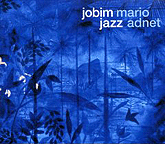 Mario Adnet "Jobim Jazz" (Adventure Music, 2007)
Mario Adnet "Jobim Jazz" (Adventure Music, 2007)
Brazilian guitarist Mario Adnet arranges a solid smooth-jazz tribute to bossa nova composer Tom Jobim, with help from folks the likes of Romero Lubambo, Ricardo Silveira and Vitor Santos... Braz-jazz elder Joyce sings on one track, "Paulo Voo Livre," fitting in nicely with the rich, mellow feel of the album. This is a little too smooth for my tastes, but strong for the genre: the songs are all played with feeling and conviction, and Adnet, writing new arrangements for brass, manages to twist some new interpretations out of these tried-and-true bossa oldies... For contemporary jazz fans, this is definitely worth checking out.
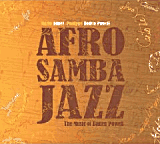 Mario Adnet & Philippe Baden Powell "Afrosambajazz: The Music Of Baden Powell" (Adventure Music, 2009)
Mario Adnet & Philippe Baden Powell "Afrosambajazz: The Music Of Baden Powell" (Adventure Music, 2009)
(Produced by Mario & Mariza Adnet)
The classic Brazilian canon of bossa nova/samba composer-guitarist Baden Powell gets a rich modern jazz makeover courtesy of jazz guitarist Mario Adnet, with Baden Powell's son, Philippe, on piano and an impressive roster of contemporary jazz players also on board. Vocalists Maucha Adnet, Monica Salmaso and Carlos Negreiros light up several songs, breaking up the instrumental tone of the album. Adnet and Powell build upon the deceptively simplicity of the original songs, adding dense, elegant, concise jazz charts, with buoyant horn arrangements and sweet performances throughout. The overall effect is a collaborative, ensemble effort, with a formal feel, but also a great deal of the original harmonic warmth of old-school bossa nova. It's really nice, one of the most solid and accessible albums to come from this group of contemporary Brazilian jazz players. Recommended!
 Mario Adnet "More Jobim Jazz" (Adventure Music, 2011)
Mario Adnet "More Jobim Jazz" (Adventure Music, 2011)
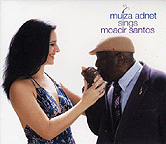 Muiza Adnet "...Sings Moacir Santos" (Adventure Music, 2007)
Muiza Adnet "...Sings Moacir Santos" (Adventure Music, 2007)
(Produced by Mario Adnet)
A mellow, majestic set honoring Brazilian composer and jazz legend Moacir Santos... As a tribute, this album is quite effective: it's packed with memorable, recognizable melodies from the many songs that Santos has composed, including collaborations with MPB luminaries such as Vinicius De Moraes and Gilberto Gil. It's also a good showcase for Ms. Adnet as a vocalist -- she's not dazzling or powerful, but she's fully inside of the songs she sings, performing them with conviction and care, and the emotional connection is nice to hear. Plus, she's got a bunch of heavyweight guests on here, including Milton Nascimento and Ivan Lins, saxophonist Dirceu Leitte, guitarist Ricardo Silveira and a host of other contemporary Brazilian jazz players... And, of course, there's Moacir Santos himself, singing on a couple of tunes. This is definitely on the softer, smooth jazz side of things, but it will also appeal to folks who don't like that style, and are more into straight bossa nova. Worth checking out!
Antonio Adolfo - see artist discography
Jerry Adriani - see artist discography
 Affonsinho "Zum Zum" (Dubas Musica, 2000)
Affonsinho "Zum Zum" (Dubas Musica, 2000)
(Produced by Affonsinho)
A compelling debut from this unpretentious young guitarist/composer... In some regards you could consider some of these songs (and their soft-pop/MPB arrangements) as a bit mainstream or generic, but there is a sweetness to Affonsinho's style that draws you in... It also doesn't hurt that his voice sounds a whole lot like Caetano Veloso, in a way that is half-imitative, half-heavenly. Like all of Affonsinho's albums, this one will grow on you, and lives up to repeated auditions. Mostly voice with acoustic guitar, and some light pop accompaniment. Recommended!
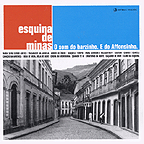 Affonsinho "Esquina De Minas: O Som Do Barzinho" (Dubas Musica, 2002)
Affonsinho "Esquina De Minas: O Som Do Barzinho" (Dubas Musica, 2002)
(Produced by Affonsinho & Gaughin)
A real gem...! This is a gentle, acoustic-based homage to the Mina Gerais-based "Clube Da Esquina" scene that included artists such as Milton Nascimento, Lo Borges, Fernardo Brant and Ronaldo Bastos, and which produced several highly regarded, spacey jazz-pop albums of the 1970s and '80s. Singer-guitarist Affonsinho gently runs through over a dozen of their classic songs, including Nascimento's "Cravo E Canela," and Lo Borges's "Para Lennon E McCartney," taking each tune at a relaxed clip, and introducing a stylistic constancy that was not always present in the exploratory efforts of the Clube in its heyday. It's really a rather lovely album -- I went into this album prepared to be dismissive, and wound up thoroughly enchanted, particularly because Affonsinho sounds so much like Caetano Veloso does in his softer acoustic moments. Quite lovely, and definitely worth checking out.
Affonsinho "Esquina De Minas, v.2: Dois Lados Da Mesma Viagem" (Dubas Musica, 2003)
(Produced by Affonsinho & Gaughin)
 Affonsinho "Bele" (Dubas Musica, 2006)
Affonsinho "Bele" (Dubas Musica, 2006)
(Produced by Affonsinho, Gaughin & Ronaldo Bastos)
Going here from my favorite tracks on the delicate Esquina De Minas album to this disc, with its larger, more overtly "pop" arrangements, it took a while for the shock to wear off. But it did, after only a couple of listens. This is a very nice, very listenable record, every bit as delicate and delicious as his earlier albums. Ronaldo Bastos and Dudu Mello are among about a half-dozen co-producers.
Affonsinho "Tudo Certo" (2007)
Affonsinho "Meu Plano" (Universal-Dubas, 2009)
Affonsinho "Voz E Vio" (2010)
Affonsinho "Zague Zeia" (Quae Brazil, 2011)
Affonsinho "Tropico De Peixes" (Quae Brazil, 2013)
 A Filial "Quem Menos Tem E Quem Mais Oferece" (Dubas, 2007)
A Filial "Quem Menos Tem E Quem Mais Oferece" (Dubas, 2007)
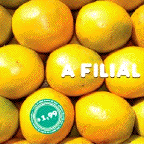 A Filial "$1,99" (Verge Records, 2008)
A Filial "$1,99" (Verge Records, 2008)
(Produced by Edu Lopes)
A playful, high-energy set of modern Brazilian hip-hop and baile funk, with a healthy dose of the creative, eclectic chaos of the manguebit samba-rock scene in there as well. These guys are pretty fun, and pretty cheerful and upbeat as well... They can summon up big, funky beats along with little, lo-fi larks -- if you're looking for something different and new (even by Brazilian standards) this album is definitely worth checking out.
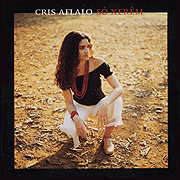 Cris Aflalo "So Xerem" (Tratore, 2004)
Cris Aflalo "So Xerem" (Tratore, 2004)
(Produced by Cris Aflalo & Luiz Waack)
A fine album, with one of Sao Paulo's rising young musicians paying tribute to her grandfather, a Northeastern musician whose recording career began in the 1930s, and spanned several decades, up through the early '70s. Though later overshadowed by forro pioneers such as Luiz Gonzaga and Humberto Texeira, Xerem was a relatively prolific artist, waxing several dozen 78s, and leaving behind a fine trove of original compositions. It's this legacy that Aflalo explores, recording thirteen songs written or cowritten by Xerem, infusing them with a playful modern feel, mixing MPB and jazz in with the catchy regional rhythms. To top it off, Aflalo has a lovely voice -- remarkably reminiscent of the young Gal Costa, with the same distinctive tone and fluid relationship to melody and meter. This is quite a nice record; it'll be interesting to see where she goes from here. Recommended.
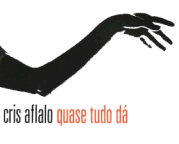 Cris Aflalo "Quase Tudo Da" (Tratore, 2008)
Cris Aflalo "Quase Tudo Da" (Tratore, 2008)
(Produced by Cris Aflalo & Luiz Waack)
The second album by independent Brazilian artist Cris Aflalo, one of many innovative musicians in Sao Paulo's booming music scene. Here Aflalo departs somewhat from the Northeastern regional music that defined her first record and concentrates more on the mellow, eclectic style of mainstream Brazilian MPB-style pop. The arrangements are mildly more florid that I'd prefer -- but not much. And when she starts to sing, it all sounds quite lovely, and the sugary stylings fit perfectly. Aflalo's voice is appealing -- honeyed, but with a teensy bit of grit to it that keeps her connected to her roots. Indeed, her sweet, fluid voice reminds me quite a bit of Marisa Monte, and that's high praise indeed. MPB lovers, and Monte's fans in particular, will definitely want to track this down... For now, probably the best way to find it is through Aflalo's webpage: www.myspace.com/crisaflalo
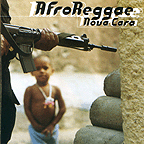 Afro-Reggae "Nova Cara" (Universal-Mercury, 2001)
Afro-Reggae "Nova Cara" (Universal-Mercury, 2001)
Despite the fairly innocuous band name, these fellows are actually full-fledged gangsta rappers, with lyrics about poverty, urban warfare and the like. Lots of vocal imitations of machine gun fire, if you catch my drift. Actually, this is less hip-hop than it is metal-rap, along the lines of old Red Hot Chili Peppers or (sigh) Rage Against The Machine... It's funny: I can't stand that stuff when I hear it in English (and really get how lame the lyrics are...) but here, it's kind of enjoyable. One cool thing is that this band seems to actually play its instruments live on this album, unlike their North American counterparts, who tinker with every little sound effect and production effect the studio can muster. There's a ragged, unpolished edge to these tracks that makes the music seem more chaotic and the band more authentically threatening. Hence, they still sound punk, even if the punk ancestry is pretty distant. If you go for this kind of stuff, and would like to hear it with a Brazilian twist, you might really like this record.
AfroReggae "Nenhum Motivo Explica A Guerra" (2006)
AfroReggae "Nenhum Motivo Explica A Guerra -- Ao Vivo" (2006)
A live, concert version of the Nenhum Motivo album...
AfroReggae "Favela Uprising" (Mr. Bongo, 2007)
Agepe - see artist discography
Agua De Moringa "Agua De Moringa" (Lagoo, 1995)
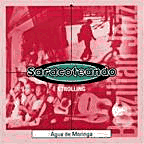 Agua De Moringa "Saracoteando" (Rob Digital, 1995)
Agua De Moringa "Saracoteando" (Rob Digital, 1995)
(Produced by Agua De Moringa)
A sweet set of sleek, modern choro performances with traditional acoustic instruments -- guitars, mandolin, flute, light percussion -- and a real feel for the material. The tunes get a little sugary in places, but generally this is very true to the source material. If you like choro revivalists such as Joel Nascimento and Henrique Cazes (or American acoustic jazz artists such as David Grisman), you'll definitely want to check this out, too!
Agua De Moringa "As Ineditas De Pixinguinha" (Sony, 2002)
Cyro Aguiar "Cyro Aguiar" (Som Livre, 1975) (LP)
(Produced by Otavio Augusto)
Nalva Aguiar "Nalva" (Beverley, 1971) (LP)
Akundum "Akundum" (Polygram, 1996)
 Akundum "Akundois" (MZA, 1997)
Akundum "Akundois" (MZA, 1997)
Afropop-reggae axe with a strong caribbean-soca influence. Also, like so much Brazilian pop, a too-strong hangover from the '80s -- too slick, predictable and goofy, although certainly better than many similar albums.
Akundum "Nova Mania" (Polygram, 1998)
Akundum "Brazilian Collection" (Polygram, 1998)
A reissue of the first Akundum album (listed above). Includes the hits "Emaconhada" and "Bailarina."
Mario Albanese "Apresentando Mario Albanese" (EP) (Ricordi, 1956)
Mario Albanese "Insonia" (Odeon, 1959)
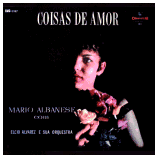 Mario Albanese "Coisas De Amor" (Chantecler, 1962) (LP)
Mario Albanese "Coisas De Amor" (Chantecler, 1962) (LP)
Pure easy-listening cheese; music to snooze by with little overt "Brazilianness" involved... Pianist/composer Mario Albanese has his fans, but I suspect it's one of those nudge-nudge, wink-wink, hipsters-love-kitsch kind of things. This isn't loungecore of the Sergio Mendes variety, but rather more like Mantovani, with maybe a smidge of Martin Denny, lots of milky string arrangements and a lethargic, plunky piano that slows things down even more. If you're looking for groovy-baby, sambadelic '60s Brazil, you might want to skip this one. (By the way, is it just me, or does the woman on the cover look exactly like the character Peggy Olson, from Mad Men?)
Mario Albanese "Longe De Voce" (Fermata) (LP)
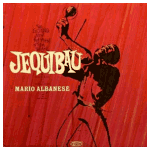 Mario Albanese "Jequibau" (Epic Records, 1965) (LP)
Mario Albanese "Jequibau" (Epic Records, 1965) (LP)
The title track, "Jequibau," is revered (by some) as a loungecore gem, but it's still a little too leaden for me. This is still too gooey and un-samba for my tastes, despite its praise as a "balanco" dance classic. Sorry, I'm just not buying it on this one. And yet, as noted above, Albanese has his fans. So you may have to figure this one out for yourself.
Marina Alcina "Marina Alcina" (Continental, 1973) (LP)
Marina Alcina "Marina Alcina" (Continental, 1974) (LP)
Marina Alcina "Plenitude" (Copacabana, 1979) (LP)
Marina Alcina "Prenda O Tadeu" (Copacabana, 1985)
Marina Alcina "Bucaneira" (Origem, 1992)
Marina Alcina & Bojo "Agora" (Tratore, 2004)
Marina Alcina "Confesso" (Som Livre, 2007)
Marina Alcina "Confete E Serpentina" (Tratore, 2008)
Alcione - see artist discography
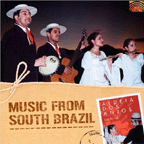 Aldeia Dos Anjos "Music From South Brazil" (Arc Music, 2002)
Aldeia Dos Anjos "Music From South Brazil" (Arc Music, 2002)
Traditional folkloric "country" music from the gauchos of Rio Grande Do Sul, which sounds very different from most Brazilian music you're likely to have heard... This acoustic quartet is pretty lively and pretty polished; for some reason I keep being reminded of Italian or Sardinian folk music when I listen to this CD. It might not be for everyone, but this non-samba style is definitely another part of the Brazilian cultural patchwork...
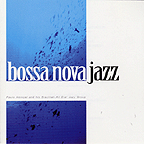 Paulo Alencar "The Best Of Bossa Nova Jazz" (Castle Pie, 2001)
Paulo Alencar "The Best Of Bossa Nova Jazz" (Castle Pie, 2001)
I'm normally pretty resistant to '60s pop kitsch, but these swanky pop-jazz recordings are pretty swinging, especially the backbeat-heavy "Ziriguidum," which is as perky and cheerful a loungecore classic as you could ever hope for. Alencar was a Rio native who moved to LA and did session work with Neil Diamond and others, and made a few albums for stateside labels such as Atco and Kapp. This CD appears to be a near-exact reissue of a 1963 Atco album, Jazza Nova, with two extra songs of indeterminate origin... There are a few tepid tracks, but mostly it's fun stuff, a notch or two above the standard-issue bossa-jazz ensembles of the time. The downside of this British import is there are no liner notes -- none -- making it kinda difficult to find out when these recordings are from, or who played on these "all-star" sessions. (In particular, who was the adorable female vocalist on "Ziriguidum"?) Still, it's definitely worth checking out, especially if you're looking for fun early '60s fare.
Paulo Alencar "Jazza Nova" (Atco Records, 1963) (LP)
Paulo Alencar "The Great Hits Of Brazil" (Kapp Records, 196--?) (LP)
Aleuda "Oferenda" (Carmo, 1984) (LP)
(Produced & arranged by Hermeto Pascoal)
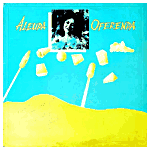 Aleuda "Oferenda" (Far Out Records, 2000)
Aleuda "Oferenda" (Far Out Records, 2000)
(Produced & arranged by Hermeto Pascoal)
As far as I can tell, this digital-age release is an expanded reissue of the 1984 album with singer Alueda joined by avant-jazznik Hermeto Pascoal and a whole herd of Brazilian jazz pros such as Zeca Assumpcao, Robertinho Silva and Jaques Morelenbaum, exploring a set of Northeastern musical themes. The reissue adds a couple of remix tracks.
Johnny Alf - see artist discography
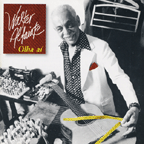 Walter Alfaiate "Olha Ai" (Alma/Eldorado, 1999)
Walter Alfaiate "Olha Ai" (Alma/Eldorado, 1999)
(Produced by Marco Aurelio)
A beautiful, no-nonsense set of '70s-style acoustic pagode sambas, with the buoyant chorus and warm, melodic cavaquinho and guitar riffs. Songwriter Walter Nunes is nicknamed Walter The Tailor (Alfaiate) because of his "day job" as a tailor in Rio, work he's done since the 1940s... He's an older gentleman, and his voice reflects his years, although this thickness of tone just adds to the air of authenticity and unpretentiousness that makes this album so nice. Alfaiate has worked at the margins of the samba scene for decades... In the 1970s Paulinho Da Viola recorded several of his songs and put him on the map as a samba composer; you can also hear him perform on the Piraja "Equina Carioca" album that Beth Carvalho produced around the same time this disc came out. Nice stuff... definitely recommended!
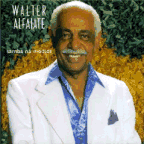 Walter Alfaiate "Samba Na Medida" (CPC-UMES, 2003)
Walter Alfaiate "Samba Na Medida" (CPC-UMES, 2003)
(Produced by Marcus Vinicius De Andrade & Joao Moreirao)
Another solid, no-nonsense, classy old-school acoustic pagode album, with sweet, muscular samba melodies, strong vocals and an ever-present chorus. Fine music. Recommended!
Walter Alfaiate "Tributo A Mauro Duarte" (2006)
Jorge Alfredo & Chico Evangelista "Bahia Jamaica" (RCA Victor, 1981) (LP)
(Produced by Luiz Mocarzel & Antonio Carlos da Oliveira)
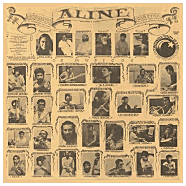 Aline "Aline" (Companhia Vento de Raio, 1979) (LP)
Aline "Aline" (Companhia Vento de Raio, 1979) (LP)
A very weird and amazingly diverse album from Minas Gerais singer and cultural/political activist Aline Mendonca Luz, who sang with Clementina de Jesus and others in the early '70s, cut a few singles for RCA before releasing this debut album at decade's end. Aline mixes multiple styles -- edgy MPB, avant-folk, jazz-fusion, and regional styles, with a particularly intriguing dip into forro music at the start, and reprises several of her signature songs, including "Amo-te (Mesmo?) Muito", which was written especially for her by Caetano Veloso... It's a very ambitious album, challenging and frequently semi-unlistenable (depending on your tastes, and on your devotion to purposefully difficult music) but certainly worth a spin. An impressive garrison of top talent performs with Aline on this album -- Joao Bosco contributes three songs and plays guitar on one; Jaime Alem plays on several tracks, Toninho Horta on one; Raphael Rabello, Leo Gandelman... It's an impressive roster. Aline has one of those husky, rough female voices that only Brazilian music can foster, but she also has a very expansive artistic vision. This isn't an album that I, personally, would need to come back to often, but folks interested in the avant fringes of Brazilian jazz and psychedelic folk will probably want to check it out.
Aline "Uma Face, Outra Face" (Companhia Vento de Raio, 1982) (LP)
Aline "Mares De Minas" (Companhia Vento de Raio, 1988) (LP)
Alma Brasileira "Alma Brasileira" (Warner, 1978) (LP)
Laurindo Almeida - see artist discography
Almondegas "Almondegas" (Continental, 1975) (LP)
This was the original group of the pop duo, Kleiton & Kleidir... Almondegas recorded four albums in the 1970s before the duo split off and formed their own act...
Almondegas "Aqui" (Continental, 1975) (LP)
Almondegas "Alhos Com Bugalhos" (Phonogram, 1977) (LP)
Almondegas "Circo De Marionetes" (Phonogram, 1975) (LP)
Almondegas "Gaudencio Sete Luas" (Continental, 1977) (LP)
A best of set...
Almondegas "Warner 30 Anos"
Almondegas "Nova Serie" (Warner, 2008)
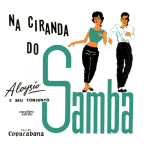 Aloysio E Seu Conjunto "Na Ciranda Do Samba" (Copacabana, 1962) (LP)
Aloysio E Seu Conjunto "Na Ciranda Do Samba" (Copacabana, 1962) (LP)
(Produced by Aloysio Figueiredo)
Cornball EZ-listening samba instrumentals, with dit-dit-ditty organ playing at the fore, and a bit of mildly jazzy electric guitar, sort of along the same lines as Walter Wanderley, but even cornier. A vocal group known as Os Modernistas (including a soloist named Cacau) provide some stylistic respite, and the few tunes where they perform have a fun, kitschy quality... The all-instrumental tunes, however, aren't likely to stick to your ribs. Too goofy for me.
Atualfo Alves - see artist discography
 Carmelia Alves "Abraca Jackson Do Pandeiro E Gordurinha" (UMES, 2004)
Carmelia Alves "Abraca Jackson Do Pandeiro E Gordurinha" (UMES, 2004)
A tribute to two of the giddiest and most cheerful regional artists of the 1950s and early '60s, forro star Jackson Do Pandeiro and northeastern songwriter Gordurinha, who penned the hit "Chiclete Com Banana." Sounds yummy.
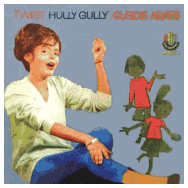 Cleide Alves "Twist/Hully Gully/Cleide Alves" (RGE, 1964)
Cleide Alves "Twist/Hully Gully/Cleide Alves" (RGE, 1964)
Jovem guarda teenybopper rocker Cleide Alves cut her first single back in 1960, and the following year she contributed vocals to the first album by Renato E Seus Blue Caps. Apparently she had enough mojo in her career to record two solo albums, including this gem, with Renato and his band backing her once again. I'm not sure who was backing her on this record, but it's a nice solid set, with peppy frat-rock arrangements and super-chirpy, girly vocals. She's a little mousier-sounding than even Celly Campello and Wanderlea, the fabbest femmes of the genre, but no less dynamic and delightful. Annette Funicello, look out!
Cleide Alves "Cancao De Nos Dois" (RCA Victor, 1970) (LP)
Francisco Alves - see artist discography
Gilberto Alves "Selecao De Ouro - 20 Sucessos" (EMI-Brasil, 1998)
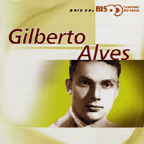 Gilberto Alves "Serie Bis - Cantores Do Radio" (EMI-Brasil, 2000)
Gilberto Alves "Serie Bis - Cantores Do Radio" (EMI-Brasil, 2000)
Now a lesser-known star of Brazil's radio days, Gilberto Alves recorded extensively in the late 1930s and '40s, and was one of the best-beloved singers of his generation. His style encompassed big band crooning as well as straightforward samba cancao, all delivered in a fresh-sounding, friendly voice. Not as studiously suave as his contemporaries such as Orlando Silva or Francisco Alves, Gilberto is in a sense a more inviting, less moderated singer -- this is one of the best collections in this series, particularly if you are looking for the old stuff!
 Gilberto Alves "Serie Raizes Do Samba" (EMI-Brasil, 2000)
Gilberto Alves "Serie Raizes Do Samba" (EMI-Brasil, 2000)
This single-CD best-of only has three tracks that overlap with the 2-CD Cantores Do Radio collection above... That's because this disc concentrates on later recordings -- a few from the 1950s, but most from the '60s and a few from 1977 -- the other collection also reaches into these eras, but chooses different songs, so the two retrospectives compliment each other perfectly. Highly recommended.
 Gilberto Alves "Saudade Nao Tem Fim" (Revivendo)
Gilberto Alves "Saudade Nao Tem Fim" (Revivendo)
Lucio Alves - see artist discography
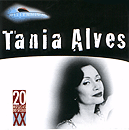 Tania Alves "Millennium" (Polygram, 1999)
Tania Alves "Millennium" (Polygram, 1999)
Alves is an interesting throwback to the lush romanticism of the pre-bossa "radio singers," who in turn took their inspiration from the syrupy bolero vocalists that dominated Latin American pop throughout the 20th Century. These mid-1990s recordings generally have nice understated arrangements -- although the collection gradually moves from nice acoustic backings to more cloying string arrangements. Alves is a fairly throaty, declarative singer, although hardly as strident as, say, Maria Bethania. Bossa or rock fans probably will find little here to hold their attention, but folks with a classicist's sweet tooth may enjoy the slurpy, yet straightforward sentimentality.
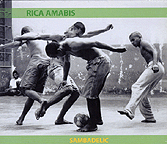 Amabis "Memorias Luso/Africanas" (Mais Um Discos, 2013)
Amabis "Memorias Luso/Africanas" (Mais Um Discos, 2013)
(Produced by Gui Amabis)
The first solo album by multi-instrumentalist Gui Amabis, who is best known for his work as the producer of two albums by vocalist CeU. She appears on this album, as well as Lucas Santtana and others...
 Rica Amabis "Sambadelic" (YBrazil?, 2000)
Rica Amabis "Sambadelic" (YBrazil?, 2000)
(Produced by Mauricio Tagliari)
Electronica and DJ mixing have taken firm root in Brazil, echoing the mix-and-match syncretism that inspired the tropicalia scene back in the late '60s. The classics of multiple genres -- including old tropicalia -- now provide rich fodder for remixes and radical reworkings, as this new disc demonstrates. Forro legend Luiz Gonzaga, funk pioneer Tim Maia, old-school sambista Ataulfo Alves and the classic "A Falsa Baiana" all wind up in the mix here, as singer Andrea Marquee and a slew of Paulista compatriots pitch in. Overall the drum'n'bass based mixing seems a little rigid, though even with the lack of flow there are some surprising moments. For those looking for more examples of contemporary mixing to join the few records to hit our shores -- such as Suba, Otto and Bebel Gilberto -- this disc is certainly worth checking out.
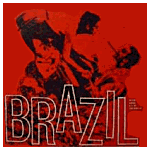 Nestor Amaral "Brazil" (Golden Tone Records, 19--?) (LP)
Nestor Amaral "Brazil" (Golden Tone Records, 19--?) (LP)
A Brazilian native who found success abroad, guitarist Nestor Amaral came to the United States as the musical director for Carmen Miranda's Banda Na Lua, and appeared in several films with Miranda. Amaral became one of Hollywood's go-to men for Latin music in film scores, including movies such as Hollywood In Havana and The Three Caballeros. He recorded several budget-line albums as a bandleader, including this one and several others with non-Brazilian themes.
Nestor Amaral "Holiday In Brazil" (Golden Tone Records, 19--?) (LP)
Nestor Amaral "Holiday In France" (Tops Records, 19--?) (LP)
Odette Amaral "A Tropicalissima" (Olympic) (LP)
(Produced by Nelson Trigueiro)
Rodrigo Amarante "Cavalo" (Mais Um Discos, 2014)
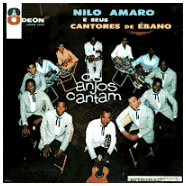 Nilo Amaro & Seus Cantores De Ebano "Os Anjos Cantam" (Odeon, 1962) (LP)
Nilo Amaro & Seus Cantores De Ebano "Os Anjos Cantam" (Odeon, 1962) (LP)
A very unusual album, capturing some of the '60s musical crosscurrents that aren't usually associated with Brazilian pop. This cheerful vocal chorus, under the direction on arranger Nilo Amaro, combined North American-style gospel/chorale and Greenwich Village folk with a subtle undercurrent of Brazilian samba, and a teeny smidge of teenybopper rock-pop... At times the female voices remind me of the crystalline-toned Trio Esperanca, although the repertoire goes off in some odd, interesting tangents. The group spotlighted their basso profondo baritone, Noriel Vilela, who later went solo during the samba-rock scene and is best known for his swinging version of "Sixteen Tons"; he isn't the only soloist here, though, but you can see why he might have wanted to bust loose from this sometimes-churchy ensemble. Intriguing material... Probably not for everyone, but still kind of unique.
Nilo Amaro & Seus Cantores De Ebano "Os Anjos Cantam, v.2" (Odeon, 1963) (LP)
Nilo Amaro & Seus Cantores De Ebano "Quase Um Sonho" (Odeon, 1964) (LP)
Nilo Amaro & Seus Cantores De Ebano "Raizes" (Polyfar, 1980) (LP)
 Nilo Amaro & Seus Cantores De Ebano "20 Super Sucessos" (EMI, 2007)
Nilo Amaro & Seus Cantores De Ebano "20 Super Sucessos" (EMI, 2007)
A best-of set, gathering a generous selection of material by this 1960s vocal group...
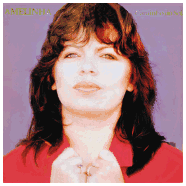 Amelinha "Caminho Do Sol" (CBS, 1985) (LP)
Amelinha "Caminho Do Sol" (CBS, 1985) (LP)
(Produced by Raimundo Fagner & Fausto Nilo)
Bland, standard-issue, mainstream MPB, reminiscent of Gal Costa or perhaps more of Elba Ramalho, since she also dips into a bit of poppy forro as well. I suppose she's an okay vocalist, but the music is so generic and so '80s, with gooey "adult pop" arrangements, airy synthesizers and insincere electric guitar riffs, that the production is fairly irritating. Can't say I'd recommend it, but I'm sure she has her fans. They all do.
Marcos Amorim Trio "O Boto" (1993)
Marcos Amorim Trio "Luz Da Lua" (1998)
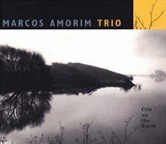 Marcos Amorim Trio "Cris On The Farm" (Adventure Music, 2003)
Marcos Amorim Trio "Cris On The Farm" (Adventure Music, 2003)
A mellow set of jazz/acoustic guitar work, which ranges from moments of Pat Metheny-ish echo to bouncier, Baden Powell-esque romps and quieter, more exploratatory moods. It's pretty nice. Amorim is joined by bassist Ney Conceicao and the ever-ubiquitous Robertinho Silva on percussion... A quiet, compact trio that lets the guitar stay front and center.
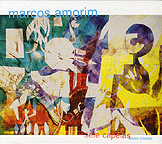 Marcos Amorim "Sete Capelas" (Adventure Music, 2006)
Marcos Amorim "Sete Capelas" (Adventure Music, 2006)
As a rule, I'm not a big fan of modern soft jazz, but this is quite a lovely record. Brazilian guitarist Marcos Amorim is consistently inventive and engaging on this pretty-sounding, melodically based album, crafting mellow space-out music that never lapses into pure gooeyness or by-the-numbers smooth jazz conventions. Only toward the end of the disc do a few songs get too gooey for me, but on the whole this was a very nice record to have on... Mainstream jazz fans, New Agers and new acoustic listeners will all find something to love about this album; possibly neo-folkies will as well. Worth checking out!
 Marcos Amorim Trio "Portraits" (Adventure Music, 2010)
Marcos Amorim Trio "Portraits" (Adventure Music, 2010)
Super-gooey fusion/easy listening instrumentals, with Jorge Albuquerque on electric bass and Rafael Barata on drums. I couldn't hang with this one... It was just too goopy for me.
 Pedro Amorim "Interpreta Luperce Miranda" (Buda Musique, 1995)
Pedro Amorim "Interpreta Luperce Miranda" (Buda Musique, 1995)
A tribute to the late velha guarda mandolin master, Luperce Miranda, by Pedro Amorim, of the choro revival group, O Trio.
Pedro Amorim & Maria Teresa Madeira "Sempre Nazareth" (Kuarup, 1998)
Leny Andrade - see artist discography
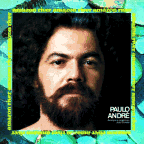 Paulo Andre "Amazon River" (Continental, 1980) (LP)
Paulo Andre "Amazon River" (Continental, 1980) (LP)
(Produced by Joao Donato)
Absolutely dreadful. Paulo Andre Barata was a successful songwriter (notably remembered for the hit, "Foi Assim," recorded by Fafa De Belem, and included here as well) but he's a less-than inspiring singer, and this album is drenched in bland, disco-era overproduction, full of icky keyboards and glossy ornamentations. The title track, which opens the album, sounds like an overly-enthusiastic cover of the "Love Boat" theme... Things don't get much better from there. This reminds me of Marcos Valle's later work, where the tacky arrangements overwhelm almost any artistic merits the songs themselves might have had. It's really quite terrible. In addition to Joao Donato, this features contributions by Ze Roberto Bertrami (of Azimuth fame), saxophonist Nivaldo Ornellas, and other MPB/fusion mainstays... Blech!
Miguel Angel "Samba Na Onda" (Equipe)
Nelson Angelo - see artist discography
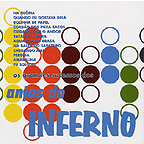 Anjos Do Inferno "Os Grandes Sucessos" (RCA, 1963) (LP)
Anjos Do Inferno "Os Grandes Sucessos" (RCA, 1963) (LP)
A wonderful twelve-song retrospective of one of the greatest vocal groups from Brazil's golden era of "radio singers" (in the 1930s and '40s). Anjos Do Inferno were one of the groups that all others were measured against, and on these lively classic recordings you can see why. This includes their creative 1947 arrangement of Ary Barroso's "Aquarele Do Brasil," along with other songs that ably showcase their tight, inventive harmonies. There is also a lot of material, particularly from the early 1950s when the group was in decline, that has a distinctly non-Brazilian feel to it: the collection opens with "Perdida," a romantic bolero that has a distinct Cuban twang to it; later, on "Tu Solo Tu," they sing a straight-up, Spanish-language, Mexican-style ranchera tune. Presumably they were in search of an audience in the Spanish-speaking world, and though they did sound great on this sort of material, they sounded a lot better singing sambas. At any rate, this is a wonderful record, and well worth picking up if you want to check out the world of pre-bossa nova Brazilian pop.
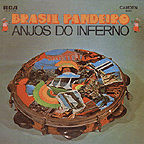 Anjos Do Inferno "Brasil Pandiero" (RCA, 1963) (LP)
Anjos Do Inferno "Brasil Pandiero" (RCA, 1963) (LP)
Anjos Do Inferno dissolved in the early 1950s, but briefly reformed to record this album. The perky arrangements are generally a bit rinky-dink, but within a song or two, the band will win you over with their smooth, good-natured approach. Side One of the original album was devoted exclusively to songs by Dorival Caymmi, the preeminent songwriter of his time, and which the Anjos originally recorded in the early 1940s. Side Two makes room for other equally groovy samba composers, with songs that also date back to the prewar years of the early 'Forties. It's quaint, and effective if you can get past the blithe, by-the-numbers feel of the orchestration.
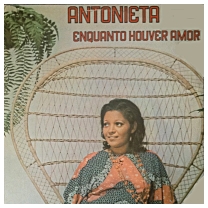 Antonieta "Enquanto Houver Amor" (Odeon, 1976) (LP)
Antonieta "Enquanto Houver Amor" (Odeon, 1976) (LP)
(Produced by Milton Miranda & Miguel Plopschi)
Syrupy, emotive ballads, more in the bolero tradition than the modern Brazilian MPB style, although there are plenty of lush, elaborate orchestrations surrounding her vocals -- courtesy of arranger Geraldo Vespar -- reflecting the house style of the 1970s Odeon label. She's an okay singer, though chances are most outsiders listening to this will find it too corny or overripe -- there's stylistic similarity to Maria Bethania, I suppose, though she has a much lighter, less grave voice than Bethania... The song selection includes one song each from Marcos Valle ("Tango") and Roberto Correa ("Meu Vicio") but for the most part these are lesser-known composers such as Chico Xavier, Alberto Gino, Roberto Koruga... Not exactly household names, though I'm sure diligent research into the sappier side of Brazilian pop would yield more info about them all. For me, this one was not a keeper.
Antonio Carlos & Jocafi - see artist discography
Arnaldo Antunes - see artist discography
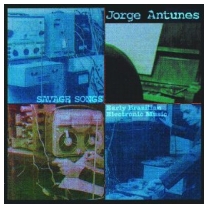 Jorge Antunes "Savage Songs -- Early Brazilian Electronic Music: 1961-1970" (Pogus, 2003)
Jorge Antunes "Savage Songs -- Early Brazilian Electronic Music: 1961-1970" (Pogus, 2003)
Bleepy, bloopy, seriously old-school electronic music, the kind of stuff you'd hear in cheapo-indie sci-fi films like Dark Star, way back when. To my untrained ear, this doesn't sound that much different than similar stuff produced elsewhere -- in the USA and Europe -- but of course, that's part of the charm. Certainly worth checking out, if you enjoy this really primitive form of electronic music.
Jorge Antunes "Musica Eletroacustica: Periodo Do Pioneirismo" (2007)
Jorge Antunes "Poeticus: Obras Para Orquestra" (ABM Digital, 2010)
Jorge Antunes/Various Artists "In Defense Of The Machine" (Pogus, 2013)
The music of Jorge Antunes, played by several modern electronic artists...
Aparecida - see artist discography
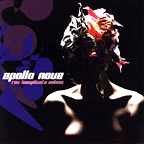 Apollo Nove "Res Inexplicada Volans" (Crammed Disc, 2006)
Apollo Nove "Res Inexplicada Volans" (Crammed Disc, 2006)
Richly layered Brazilian pop-electronica, crafted by producer/multi-instrumentalist Apollo Nove, a pop pioneer from Sao Paulo... Fans of the late mixmaster Suba, Marcelo D2 or Fernanda Porto will find a kindred spirit here. Some of the tracks are a bit facile (particularly the English-language opener, "Mr. Right Now," which is embarrassingly dopey...) but other tracks are quite nice, including a pair of tunes featuring vocals by samba-soulster Seu Jorge... Throughout, the album has lovely sonic shading and rich acoustic textures -- the feel of the sound is lovely, even if the soul-electronic format might not be to everyone's taste. Anyway, if you're looking for new frontiers in Brazilian music, this is certainly an album to check out.
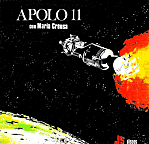 Apolo 11 "Apolo 11 Com Maria Creuza" (JS Discos, 1969)
Apolo 11 "Apolo 11 Com Maria Creuza" (JS Discos, 1969)
A fascinating historical curio, featuring singer Maria Creuza before her emergence as a solo artist, working here with songwriter Antonio Carlos Marques, who went on to become half of the duo Antonio Carlos & Jocafi... Not only that, but Tutty Moreno, later a key player on the Brazilian jazz scene, is sitting in on drums! Despite the trippy, Space Age artwork, this is a fairly conservative set of bossa balladry, hardly the sort of perky pop-samba crossovers that Antonio Carlos later became known for, and a fairly sedate set, for all concerned. It's nice, but it sounds old-fashioned and out of date, considering the dynamism of the tropicalia scene at the time. Still, it's certainly worth checking out, particularly if you're a Creuza fan.
Aquarius Band "Aquarius Band" (Continental, 1970) (LP)
(Produced by Pocho Perez & Walter Silva)
Groovy-looking psychedelic cover art, a generic "hippie" band name, but mostly just a set of pop covers of songs from the US, UK and Continental Europe. Also includes a version of Paulo Diniz' "Quero Voltar P'ra Bahia," which was pretty funky in the original version...
Aquattro "Toca Luperce Miranda" (2007)
Jorge Aragao - see artist discography
Ara Ketu - see artist discography
Guilherme Arantes - see artist discography
Eduardo Araujo - see artist discography
Manezinho Araujo "Cuma E O Nome Dele?" (RCA, 1974) (LP)
Manezinho Araujo "Cuma E O Nome Dele?" (Revivendo, 2003)
Marco Antonio Araujo - see artist discography
Monica Araujo "Monica Araujo" (Chantecler, 1993)
The debut album from singer Monica Araujo, who apparently was the daughter of MPB/jovem guarda stars Eduardo and Silvinha Araujo... I'm not sure how many albums Monica eventually made, though these two seem to be pretty obscure...
Monica Araujo "Lua Brasileira" (Paradoxx, 1996)
Monica Araujo "Monica Araujo" (Ouver, 2004)
Severino Araujo - see artist discography
Argemiro Patrocinio -- see letter "P"
Marcos Ariel - see artist discography
Armandinho - see artist discography
Armandinho "Armandinho" (Universal, 2004)
FYI - this is a different guy... A pop-reggae singer, not the cavaquinho whiz who is listed above...
Armandinho "Ao Vivo" (Universal, 2007)
Again, this is the reggae dude.
Armandinho "Casinha" (Atracao, 2007)
Reggae dude.
Armandinho "Armandinho" (Atracao, 2008)
Still the reggae dude...
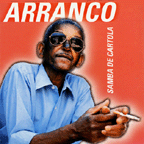 Arranco "Samba De Cartola" (Dubas, 1993/2001)
Arranco "Samba De Cartola" (Dubas, 1993/2001)
It's a little strange to hear the driving, old-school sambas of escola legend Cartola refashioned into slower MPB ballads... Not that it hasn't been done before, or that Cartola's music didn't already have a romantic elegance to it, but it's the cumulative effect of hearing an entire album's worth of radical re-toolings that makes a big impact. I imagine for some, more pop-oriented listeners, this disc way come as a welcome modernization or even as a revelation... For me, though, it's too slushy and stylized, and the vocal harmonies come just a bit too close to the sleek drabness of the Quarteto Em Cy... This has its moments, but on balance, it was a record that I could easily live without.
Arranco De Varsovia "Na Cadencia Do Samba" (Dubas, 2005)
Arranco De Varsovia "Samba E Progresso" (Dubas, 2008)
Arranco De Varsovia "...Canta Martinho Da Vila" (Mills, 2011)
Arranco De Varsovia "Na Panela Pra Dancar" (Mills, 2014)
Lucas Arruda "Sambadi" (Favorite Recordings, 2013)
Asa De Aguia - see artist discography
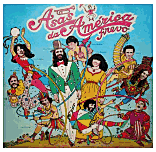 Asas Da America "Frevo" (Barclay, 1983)
Asas Da America "Frevo" (Barclay, 1983)
(Produced by Paulo Rafael & Carlos Fernando)
A regional music band, with guest appearances by Geraldo Azevedo, Lenine, Lula Queiroga, Elba Ramalho, Alceu Valenca and others...
Patty Asher "Bossa, Jazz 'N' Samba" (Zoho, 2011)
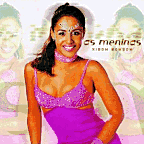 As Meninas "Xibom Bombom" (Universal/Polydor, 1999)
As Meninas "Xibom Bombom" (Universal/Polydor, 1999)
Perky, anthemic, frothy axe pop from this (sort of) all-female band... Yeah, there are also a bunch of guys playing along in the studio, but as well as sing and look cute, the gals play guitar, bass, sax and surdo, so they're pretty legit. Spice Girl-y carnaval music, following in the footsteps of Margareth Menezes and Daniella Mercury... not classic, immortal art, but cute and fun. The title track is irresistible.
 As Meninas "As Meninas" (Universal/Polydor, 2000)
As Meninas "As Meninas" (Universal/Polydor, 2000)
More irrepressibly perky samba-pop from this cutesy gal band, including the hit, "Tapa Aqui, Descobre Ali." Although this album is packed with plenty of shameless commercial affectations and fluffy, by-the-numbers studio riffs, it's still pretty fun. It also seems slightly more rootsy than Xibom Bombom, but really, either album would get the point across. Worth checking out.
As Meninas "Bom Dia" (2000)
As Meninas "Loucas Por Voce" (Universal, 2001)
As Meninas "Ao Vivo" (Abril, 2003)
As Meninas "Simpatia Pra Curar Homem Valente" (EMI, 2006)
Badi Assad - see artist discography
Clarice Assad "Invitation: Introducing Clarice Assad" (2003)
Clarice Assad "Love, All That It Is" (NSS Music, 2008)
 Clarice Assad "Home" (Adventure Music, 2012)
Clarice Assad "Home" (Adventure Music, 2012)
(Produced by Jim Luce & Richard Zirinsky Jr.)
A samba-soaked hard-jazz outing, with pianist/vocalist Assad channeling simultaneously Nina Simone and Clara Nunes, with a smidge of Carmen Miranda in there for good measure. Ms. Assad is the daughter of Sergio Assad, and she draws on a wide range of influences, with a rugged form of mainstream jazz being perhaps the dominant strain -- plenty of keyboard flights and adventurous scat singing and other vocal explorations, along with swift, sure accompaniment by percussionists Keita Ogawa and Yousif Sheronick. Assad pays homage to Braz-jazz icon Elis Regina in the opening medley, and covers several Brazilian standards, notably Ary Barroso's "Aquarelas Do Brasil," which she reframes as a slow, tribal chant. This isn't really my cup of tea, but I can see where jazz fans might dig it.
 Clarice Assad "Imaginarium" (Adventure Music, 2014)
Clarice Assad "Imaginarium" (Adventure Music, 2014)
(Produced by Clarice Assad & Keita Ogawa)
Odair & Sergio Assad - see artist discography
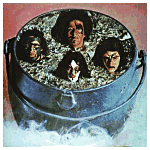 Assim Assado "Assim Assado" (CID, 1974)
Assim Assado "Assim Assado" (CID, 1974)
Cluttered but credible glam-prog from a band that was so into the band Secos & Molhados that they named themselves after a Secos song, and their album cover was a parody of the Secos record where the glammed-up band members heads are served up on silver platters: in the Assim Assado version, they are floating in an inelegant pot of stew... This disc is mostly a curio of the era -- the musical elements are similar, but the delivery is pretty clumsy, and it feels self-consciously derivative. Still, it is real-deal, old-school Brazilian weirdo-rock, and also notable for the participation of singer Miguel de Deus, formerly of the garage band Os Brazoes, a guy who later went on to record a solo album that was a major Brazilian funk gem. This album is definitely worth checking out, just don't get your hopes up too high.
Itamar Assumpcao - see artist discography
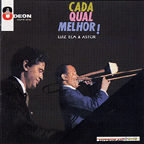 Astor & Luiz Eca "Cada Qual Melhor" (Odeon, 1961) (LP)
Astor & Luiz Eca "Cada Qual Melhor" (Odeon, 1961) (LP)
(Artistic director: Ismael Correa)
Pianist Luiz Eca, paired up with bandleader/trombonist Astor Silva, puts his chops on display, running through what I imagine must have been his standard nightclub set at the time. The opening tracks display a remarkable dynamism and innovation -- Eca really digs into the ivories on "E Luxo So" and "Yesterdays." The set swiftly devolves into tedium, though, with by-the-numbers, slightly bossa-fied versions of American standards such as " 'S Wonderful," "Cheek To Cheek" and "Moonglow," as well as Brazilian chestnuts like Ary Barroso's "Aquarela Do Brasil" and a few more contemporary tunes. Like I said, it's clearly a nightclub set, put on wax inside a studio setting... Eca stands out on a few tunes, but Astor's mellow, well-rounded brass arrangements are unremarkable and unmoving. A very professional record, but nothing to get too excited about.
 (Lord) Astor "E Dancar" (Odeon/Imperial, 1961) (LP)
(Lord) Astor "E Dancar" (Odeon/Imperial, 1961) (LP)
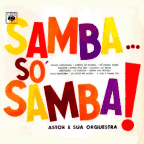 Astor E Sua Orchestra "Samba! So Samba!" (Columbia, 1963) (LP)
Astor E Sua Orchestra "Samba! So Samba!" (Columbia, 1963) (LP)
A swinging, uptempo set with samba-cancao classics and (then) newly-minted bossa hits, all done in the same juggernaut-style big band samba style. It's a little too rigid and un-emotive for me; too much of a music machine. But if you like Perez Prado's more pop-oriented albums, and would be interested in hearing something similar from a Brazilian angle, this album might wow you. Good musicianship, just sort of mechanically delivered.
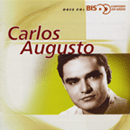 Carlos Augusto "Serie Bis - Cantores Do Radio" (EMI-Brasil, 2000)
Carlos Augusto "Serie Bis - Cantores Do Radio" (EMI-Brasil, 2000)
A syrupy singer specializing in the classic Latin American bolero, Carlos Augusto eschewed the hometown rhythm of the samba in favor of the lush romanticism of the ballroom sound. These Portuguese-language dance tunes seem to have been written mainly by Brazilians, although the style is definitely an import from el mundo espanol. Still, his vocals aren't overly corny, and the early '60s arrangements are also forceful but demure. A nice example of Brazil's participation in the wider Latin America culture.
Carlos Augusto "A Cara Do Recife"
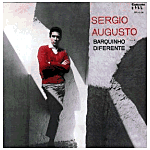 Sergio Augusto "Barquinho Diferente" (Continental, 1961) (LP)
Sergio Augusto "Barquinho Diferente" (Continental, 1961) (LP)
(Produced by Luis A. A. Botelho & Rodolfo Viana Queiroz)
A really sweet set that showcases some swinging, cheerful melodies and many of the hallmarks of the early bossa/bossa jazz years, but with a distinctive feel, largely due to Francisco de Mello Moraes's expansive, elegant arrangements. I'm not sure who was in the backing band, but it's clearly one of the many bossa-jazz bands of the era, playing with a relaxed feel that sets this record apart from the manic Brazilian jazz that was common at the time. For his part, Augusto is a very personable, appealing singer -- youthful, suave yet unpretentious, inviting -- and he really owns this album. Claudette Soares, who helped him start his career, duets on one song, "Amar E Bom," and they sound quite good together. Includes several original songs co-written with Alvaro Muniz, as well as three by sambista Roberto Ribeiro and some early bossa tunes by folks like Luiz Bonfa, Carlos Lyra and Marcos Valle. And of course, there's Augusto's own version of "Barquinho Diferente," a song he wrote in honor of Roberto Menescal that was widely recorded in the early '60s, particularly by jazz artists such as Zimbo Trio, Manfredo Fest, et al. Definitely recommended.
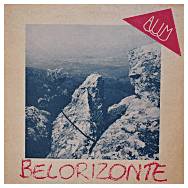 Aum "Belorizonte" (Bemol, 1983) (LP)
Aum "Belorizonte" (Bemol, 1983) (LP)
Decent, dreamy soft-toned fusion jazz, with a bit of an art-rock feel. If it weren't for the the saxophone, parts of this could almost pass as a Giant Sand album, though when they go in a more acoustic direction, the guitars get more John McLaughlin-y. I may be giving this band more credit than it deserves -- this is an obscurity, but not quite a lost gem. There's very little going on compositionally; basically they're just kind of noodling around, and all three tracks on Side One sound nearly identical to me. On Side Two they break into different sounds - louder, fuzzier electric guitar -- but there are still few well-defined thematic moments, just some more amorphous jamming.
Aurino - Seu Sax E Conjunto "Saturday Night" (RCA, 1960) (LP)
Autoramas "Stress, Depressao E Sindrome Do Panico" (Universal, 2000)
Lead singer Gabriel Thomaz made his name as a songwriter, placing hits with alt-y '90s BRock bands such as Ultraje a Rigor before founding this New Wave-ish/retro combo as a way to explore more diverse rock'n'roll styles...
Autoramas "Vida Real" (Dubas, 2001)
Autoramas "Nada Pode Parar Os Autoramas" (Tratore, 2003)
Autoramas "Teletransporte" (Tratore, 2007)
Autoramas "MTV Apresenta Autoramas Desplugado" (Globaldisc, 2009)
Autoramas "Musica Crocante" (Coqueiro Verde, 2011)
Autoramas "RRRRRRRROCK" (Tratore, 2005)
Autoramas "Mucho Gusto" (Tratore, 2007)
Jorge Autuori Trio "Jorge Autuori Trio, v.1" (Rosemblit/Whatmusic)
Jorge Autuori Trio "Jorge Autuori Trio, v.2" (Rosemblit/Whatmusic)
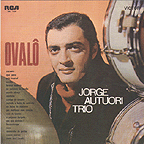 Jorge Autuori Trio "Ovalo" (RCA, 1969) (LP)
Jorge Autuori Trio "Ovalo" (RCA, 1969) (LP)
(Produced by Rildo Hora & Romeo Nunes)
Most "classic" Brazilian jazz from the 1960s leaves me pretty cold, but this is a noteworthy record. The "jazz trio" scene of the early part of the decade permitted great mediocrity and endlessly clattersome performances, all the more remarkable since many of these musicians were also key players in the breathtaking subtlety of the bossa nova sound. Anyway, this is drummer Jorge Autouri's third album and his first for the RCA label, and on it he covers some of the coolest, slickest new music to be found, including songs by Jorge Ben, Roberto Carlos, Gilberto Gil and Caetano Veloso, as well as medleys of classic samba cancao songs from decades gone by. It's not surprising that he also performs a string of songs written by Martinho Da Vila, since Da Vila's longtime producer, samba-jazz swinger Rildo Hora plays the guitar on this album. Now, to be honest, like most of the Brazilian jazz of the era, I don't think this album is really all that great -- the playing still seems rushed and heavy-handed -- but it's certainly a notch or two above many similar albums. Autuori invests more emotion and nuance into the style than many of his contemporaries, and occasionally hits a moment of grace... The one standout track turns out to be the album's only original composition, a sweet tune called "Canto Azul," which was cowritten with bassist Edson Bastos... It's on this brief, incandescent number that pianist Edson Frederico finally slows down and plays expressively, and the haunting notes that close the album out make you turn your head and wonder: why didn't they play like that on the rest of the record??
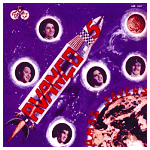 Avanco 5 "Somos Jovens" (Fama Records, 1969) (LP)
Avanco 5 "Somos Jovens" (Fama Records, 1969) (LP)
An odd album from the fringes of 1960's Brazilian pop... The disc is evenly split between super-generic surfy/Viscounts-ish pop-rock instrumentals -- total toss-off material -- and some pretty fun rock songs with most lyrics in Portuguese. I don't know the band's backstory, but apparently they also recorded an EP with Tony Campello, titled Ritmos da Juventude. (Love to check that out some day!) Anyway, several of these tracks are good for dropping into a jovem guarda teenybopper rock mix. Definitely worth checking out.
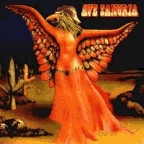 Ave Sangria "Ave Sangria" (Continental, 1975) (LP)
Ave Sangria "Ave Sangria" (Continental, 1975) (LP)
Another fascinating obscuro-oldie from the heady days of Brazil's freakiest, hippie-esque pop era... Apparently this Northeastern band had a reputation as sort of a glam act - wearing lipstick, etc., but what sticks out on the record itself is the mix of nordestino styles -- acoustic music with prominent bandolim and regional percussion, similar to what Quinteto Violado was doing at the same time -- and freaky acid rock, with fuzzy, noodly electric lead guitar and flights of crunchy distortion. Folks who like Lula Cortes should dig this too -- apparently the band had been taken under the wing of Cortes' Satwa collaborator, Lailson; Mutantes fans will also like the band's far-flung, schizophrenic start-and-stop meter shifting and stream-of-consciousness lyrical style. More kooky stuff to explore.
 Norma Avian "A Voz Revelacao" (Odeon, 1957) (LP)
Norma Avian "A Voz Revelacao" (Odeon, 1957) (LP)
 Norma Avian "Piccolissima Serenata" (Columbia Records, 1958) (LP)
Norma Avian "Piccolissima Serenata" (Columbia Records, 1958) (LP)
Axial "Senoide" (Tratore, 2008)
Mariana Aydar "Kavita 1" (Universal, 2007)
Mariana Aydar "Brasil, Sons E Sabores" (YB Music, 2007)
Mariana Aydar "Peixes Passaros Pessoas" (Universal-Zoom, 2009)
Mariana Aydar "Cavaleiro Selvagem Aqui Te Sigo" (Universal-Zoom, 2007)
Luiz Ayrao - see artist discography
Nelson Ayres "Mantiqueria" (Som De Gente, 1981) (LP)
Nelson Ayres "Perto Do Coracao" (Atracao, 2004)
Azambuja & Companhia "Azambuja & Companhia" (CID, 1975) (LP)
(Produced by Durval Ferreira)
A spinoff of the comedic television show that featured the musical duo of Chico Anysio and Arnaud Rodrigues... Haven't heard this one, but I'm curious.
Berenice Azambuja "Dose Dupla" (WEA, 2007)
A reissue of two self-titled albums...
Azes Do Samba "Azes Do Samba" (Girasom, 1973) (LP)
Anastacia Azevedo "Lumere Lumera" (Piranha, 1999)
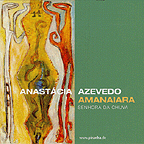 Anastacia Azevedo "Amanaiara" (Piranha, 2004)
Anastacia Azevedo "Amanaiara" (Piranha, 2004)
An aggressive, kinetic mix of Northeastern music and various brands of rock, funk and reggae from a Cearan expatriate now living in Berlin... The forro aspects drop out of the picture after the first few tunes, and a thumping rock sensibility takes over... The prominence of a sharp-sounding snare drum undercuts comparisons to the funky manguebeat scene, and nudges this more towards a plain rock sound, with lots of filigreed keyboards and harmony vocals. I wouldn't exactly say this sounds cluttered, but it is a little more forceful and angular than I like my Brazilian pop, a feeling that is heightened by Azevedo's piercing vocal style. This didn't really wow me, but I could see its appeal for folks eager for a more modernized style; maybe if it were a little softer around the edges, I could get more into it.
Geraldo Azevedo - see artist discography
 Leonel Azevedo "Estorias De Amor" (Revivendo, 2002)
Leonel Azevedo "Estorias De Amor" (Revivendo, 2002)
A 3-CD box set of songs by Leonel Azevedo...
Waldir Azevedo - see artist discography
Cristina Azuma "Violao" (1986)
Acoustic guitar from a Brazilian-born virtuoso who went on to study and teach at the Sorbonne... She also has several albums released in France that are not readily available elsewhere...
Cristina Azuma "No Palacio De La Guitarra" (Tartaruga, 1993)
Cristina Azuma "E De Lei: Guitare Du Bresil" (Loco & LEV, 1994)
Cristina Azuma "Contatos" (GSP, 1995)
Cristina Azuma & Celso Machado "Misterios Do Rio Lento" (M.S.A Voice Of Lyrics, 1998)
Cristina Azuma "Santiago De Murcia" (Frame Records, 2007)
Cristina Azuma "Dreams" (GSP, 2011)
Cristina Azuma & Paulo Bellinati "Pingue-Pongue" (Delira Musica, 2011)
Azymuth - see artist discography
 Vania Abreu "Vania Abreu" (Warner-Continental, 1995)
Vania Abreu "Vania Abreu" (Warner-Continental, 1995)

 Vania Abreu "Seio Da Bahia" (Velas, 2000)
Vania Abreu "Seio Da Bahia" (Velas, 2000)
 Vania Abreu "Eu Sou A Multidao" (BMG, 2003)
Vania Abreu "Eu Sou A Multidao" (BMG, 2003)
 Os Abutres "Os Abutres Atacam" (1968)
Os Abutres "Os Abutres Atacam" (1968)
 Mario Adnet "From The Heart" (Adventure Music, 2006)
Mario Adnet "From The Heart" (Adventure Music, 2006)
 Mario Adnet "Jobim Jazz" (Adventure Music, 2007)
Mario Adnet "Jobim Jazz" (Adventure Music, 2007)
 Mario Adnet & Philippe Baden Powell "Afrosambajazz: The Music Of Baden Powell" (Adventure Music, 2009)
Mario Adnet & Philippe Baden Powell "Afrosambajazz: The Music Of Baden Powell" (Adventure Music, 2009)
 Muiza Adnet "...Sings Moacir Santos" (Adventure Music, 2007)
Muiza Adnet "...Sings Moacir Santos" (Adventure Music, 2007)
 Affonsinho "Zum Zum" (Dubas Musica, 2000)
Affonsinho "Zum Zum" (Dubas Musica, 2000)
 Affonsinho "Esquina De Minas: O Som Do Barzinho" (Dubas Musica, 2002)
Affonsinho "Esquina De Minas: O Som Do Barzinho" (Dubas Musica, 2002)
 Affonsinho "Bele" (Dubas Musica, 2006)
Affonsinho "Bele" (Dubas Musica, 2006)
 A Filial "$1,99" (Verge Records, 2008)
A Filial "$1,99" (Verge Records, 2008)
 Cris Aflalo "So Xerem" (Tratore, 2004)
Cris Aflalo "So Xerem" (Tratore, 2004)
 Cris Aflalo "Quase Tudo Da" (Tratore, 2008)
Cris Aflalo "Quase Tudo Da" (Tratore, 2008)
 Afro-Reggae "Nova Cara" (Universal-Mercury, 2001)
Afro-Reggae "Nova Cara" (Universal-Mercury, 2001)
 Agua De Moringa "Saracoteando" (Rob Digital, 1995)
Agua De Moringa "Saracoteando" (Rob Digital, 1995)
 Mario Albanese "Coisas De Amor" (Chantecler, 1962) (LP)
Mario Albanese "Coisas De Amor" (Chantecler, 1962) (LP)
 Mario Albanese "Jequibau" (Epic Records, 1965) (LP)
Mario Albanese "Jequibau" (Epic Records, 1965) (LP)
 Aldeia Dos Anjos "Music From South Brazil" (Arc Music, 2002)
Aldeia Dos Anjos "Music From South Brazil" (Arc Music, 2002)
 Paulo Alencar "The Best Of Bossa Nova Jazz" (Castle Pie, 2001)
Paulo Alencar "The Best Of Bossa Nova Jazz" (Castle Pie, 2001)
 Aleuda "Oferenda" (Far Out Records, 2000)
Aleuda "Oferenda" (Far Out Records, 2000)
 Walter Alfaiate "Olha Ai" (Alma/Eldorado, 1999)
Walter Alfaiate "Olha Ai" (Alma/Eldorado, 1999)
 Walter Alfaiate "Samba Na Medida" (CPC-UMES, 2003)
Walter Alfaiate "Samba Na Medida" (CPC-UMES, 2003)
 Aline "Aline" (Companhia Vento de Raio, 1979) (LP)
Aline "Aline" (Companhia Vento de Raio, 1979) (LP)
 Aloysio E Seu Conjunto "Na Ciranda Do Samba" (Copacabana, 1962) (LP)
Aloysio E Seu Conjunto "Na Ciranda Do Samba" (Copacabana, 1962) (LP)
 Cleide Alves "Twist/Hully Gully/Cleide Alves" (RGE, 1964)
Cleide Alves "Twist/Hully Gully/Cleide Alves" (RGE, 1964)
 Gilberto Alves "Serie Bis - Cantores Do Radio" (EMI-Brasil, 2000)
Gilberto Alves "Serie Bis - Cantores Do Radio" (EMI-Brasil, 2000)
 Tania Alves "Millennium" (Polygram, 1999)
Tania Alves "Millennium" (Polygram, 1999)
 Rica Amabis "Sambadelic" (YBrazil?, 2000)
Rica Amabis "Sambadelic" (YBrazil?, 2000)
 Nestor Amaral "Brazil" (Golden Tone Records, 19--?) (LP)
Nestor Amaral "Brazil" (Golden Tone Records, 19--?) (LP)
 Nilo Amaro & Seus Cantores De Ebano "Os Anjos Cantam" (Odeon, 1962) (LP)
Nilo Amaro & Seus Cantores De Ebano "Os Anjos Cantam" (Odeon, 1962) (LP)
 Amelinha "Caminho Do Sol" (CBS, 1985) (LP)
Amelinha "Caminho Do Sol" (CBS, 1985) (LP)
 Marcos Amorim Trio "Cris On The Farm" (Adventure Music, 2003)
Marcos Amorim Trio "Cris On The Farm" (Adventure Music, 2003)
 Marcos Amorim "Sete Capelas" (Adventure Music, 2006)
Marcos Amorim "Sete Capelas" (Adventure Music, 2006)
 Paulo Andre "Amazon River" (Continental, 1980) (LP)
Paulo Andre "Amazon River" (Continental, 1980) (LP)
 Anjos Do Inferno "Os Grandes Sucessos" (RCA, 1963) (LP)
Anjos Do Inferno "Os Grandes Sucessos" (RCA, 1963) (LP)
 Anjos Do Inferno "Brasil Pandiero" (RCA, 1963) (LP)
Anjos Do Inferno "Brasil Pandiero" (RCA, 1963) (LP)
 Antonieta "Enquanto Houver Amor" (Odeon, 1976) (LP)
Antonieta "Enquanto Houver Amor" (Odeon, 1976) (LP)
 Jorge Antunes "Savage Songs -- Early Brazilian Electronic Music: 1961-1970" (Pogus, 2003)
Jorge Antunes "Savage Songs -- Early Brazilian Electronic Music: 1961-1970" (Pogus, 2003)
 Apollo Nove "Res Inexplicada Volans" (Crammed Disc, 2006)
Apollo Nove "Res Inexplicada Volans" (Crammed Disc, 2006)
 Apolo 11 "Apolo 11 Com Maria Creuza" (JS Discos, 1969)
Apolo 11 "Apolo 11 Com Maria Creuza" (JS Discos, 1969)
 Arranco "Samba De Cartola" (Dubas, 1993/2001)
Arranco "Samba De Cartola" (Dubas, 1993/2001)
 Asas Da America "Frevo" (Barclay, 1983)
Asas Da America "Frevo" (Barclay, 1983)
 As Meninas "Xibom Bombom" (Universal/Polydor, 1999)
As Meninas "Xibom Bombom" (Universal/Polydor, 1999)
 As Meninas "As Meninas" (Universal/Polydor, 2000)
As Meninas "As Meninas" (Universal/Polydor, 2000)
 Clarice Assad "Home" (Adventure Music, 2012)
Clarice Assad "Home" (Adventure Music, 2012)
 Assim Assado "Assim Assado" (CID, 1974)
Assim Assado "Assim Assado" (CID, 1974)
 Astor & Luiz Eca "Cada Qual Melhor" (Odeon, 1961) (LP)
Astor & Luiz Eca "Cada Qual Melhor" (Odeon, 1961) (LP)
 Astor E Sua Orchestra "Samba! So Samba!" (Columbia, 1963) (LP)
Astor E Sua Orchestra "Samba! So Samba!" (Columbia, 1963) (LP)
 Carlos Augusto "Serie Bis - Cantores Do Radio" (EMI-Brasil, 2000)
Carlos Augusto "Serie Bis - Cantores Do Radio" (EMI-Brasil, 2000)
 Sergio Augusto "Barquinho Diferente" (Continental, 1961) (LP)
Sergio Augusto "Barquinho Diferente" (Continental, 1961) (LP)
 Aum "Belorizonte" (Bemol, 1983) (LP)
Aum "Belorizonte" (Bemol, 1983) (LP)
 Jorge Autuori Trio "Ovalo" (RCA, 1969) (LP)
Jorge Autuori Trio "Ovalo" (RCA, 1969) (LP)
 Avanco 5 "Somos Jovens" (Fama Records, 1969) (LP)
Avanco 5 "Somos Jovens" (Fama Records, 1969) (LP)
 Ave Sangria "Ave Sangria" (Continental, 1975) (LP)
Ave Sangria "Ave Sangria" (Continental, 1975) (LP)
 Anastacia Azevedo "Amanaiara" (Piranha, 2004)
Anastacia Azevedo "Amanaiara" (Piranha, 2004)


